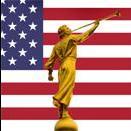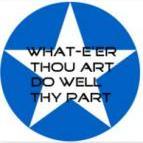Leaderboard
Popular Content
Showing content with the highest reputation on 06/09/19 in all areas
-

Sacrament passed in the Temple
Nacho2Dope and 2 others reacted to NeedleinA for a topic
We just had a visiting General Authority speak to us. He mentioned something that I never thought about before, so I'm simply sharing this as an FYI interesting item. He mentioned that as part of his assignment he spends most of his Sundays at Stake Conferences or other meetings which don't involve the Sacrament on a routine basis like other members. He shared that the General Authorities will meet once a month at the Temple (he didn't specify which or if it alternates, so I would assume SLC) to have the Sacrament and share their testimonies. He mentioned how last time he was the one to pass the Sacrament (like a deacon) to Pres. Nelson. Kind of neat tidbit of fun trivia. Enjoy.3 points -
He did not err. His words are humbling to one as proud and weak as I. Moroni's words as written in Mormon chapter 9 give a perfect explanation. See also Ether 12:23-263 points
-
@Vort = Elder Carl B. Cook - Presidency of the Seventy In addition, Elder Dale G. Renlund - Apostle, spoke to us in a leadership meeting yesterday. Towards the end of the meeting, time was given for about 20 random (really random) questions from the attendees. Of the twenty questions, two were: 1. Why couldn't Adam and Eve have children in the Garden of Eden? 2. Unlike in the past, why don't we hear more about devils being cast out or them taking possession of bodies? The Apostle smiled at both questions and quoted the following scripture in both answers he gave Alma 37:112 points
-

"A Review of the Annotated Edition of the Book of Mormon"
Just_A_Guy reacted to tesuji for a topic
This appears to be a very poorly researched book, and to be full of misleading teachings about the Book of Mormon. "A Review of the Annotated Edition of the Book of Mormon" By Stephen Smoot https://www.plonialmonimormon.com/2019/06/a-review-of-the-annotated-edition-of-the-book-of-mormon-part-1.html1 point -

Can you use the Priesthood to bless animals?
Vort reacted to The Folk Prophet for a topic
Mosiah 13:19 "For in six days the Lord made heaven and earth, and the sea, and all that in them is; wherefore the Lord blessed the sabbath day, and hallowed it." Is it reasonable to conclude that any time the scriptures speak of the Lord blessing something that it means it is appropriate to lay hands upon said thing and declare healing through priesthood authority? No, it is not.1 point -
Thanks for the clarification. I don't think anyone is suggested that God doesn't (or that we don't, or shouldn't) bless animals. The question centers around the ordinance of the laying on of hands, not the general idea of blessing someone/something.1 point
-
@pam, I beg you on bended knee, please give me back the power to delete my own posts. Pleeeeeeeeeease. I promise I won't abuse it. We'll all be happier if I can just nuke dupes, unintentional quotes, or even the odd really stupid post.1 point
-
Write a lengthy history, @GaleG. Your choice of topic. Any topic at all. You name it. For the sake of ease, pick something you're intimately familiar with—say, an autobiography. Will you make any mistakes? You bet you will. At times, you will botch stories, misremember events, and give warped or perhaps even entirely untrue accounts. You will misattribute who said what. You will reverse the order of some events, maybe even reversing cause and effect. Despite your very best efforts, your memory will betray you. You are a human being. As such, you are subject to all the imperfections and foolishness of human beings. I don't care how well you think you know your subject. You WILL be wrong about some things. The best you can do is, well, to do the best you can do. Nephi was a human being, too. He was simply honest and introspective enough to realize that fact and what it implied, and make it explicit in his own writings. Mormon and Moroni do the same thing, as @mikbone mentioned.1 point
-

Can you use the Priesthood to bless animals?
askandanswer reacted to The Folk Prophet for a topic
I think a commonality in these stories is a certain level of not knowing any better, for which God tends to be quite understanding. When someone who doesn't know it is inappropriate to do certain ceremonial things certain ways, the Lord isn't necessarily going to reject their faithful efforts because of the mistake. But that doesn't mean that when one does know better that the successful stories of faith in action prove that appropriate application of any given ceremony can or should now safely be rejected.1 point -
What weakness, according to the flesh, did Nephi believe would prevent him from making an accurate record? @mikbone covered this pretty well. I have interpreted this to mean his "weakness" in writing. Later on Nephi says the following, "And now I, Nephi, cannot write all the things which were taught among my people; neither am I mighty in writing, like unto speaking; for when a man speaketh by the power of the Holy Ghost the power of the Holy Ghost carrieth it unto the hearts of the children of men." (emphasis mine) Due to our weakness in writing we can see how some people will take advantage (make an offender for a word) out of something that is inspired. Nephi is in this verse providing two important aspects: 1) God supports us in our weakness when we are doing as he has commanded 2) He recognizes his own weakness, he recognizes the weakness of others, but he does not condemn them. Mikbone provide the verses of scripture pertaining to Moroni and his father Mormon. Did Nephi 'think' or 'know' his recordings of the wars, contentions, and destructions of his people were sacred? Nephi had two plates that he wrote upon and handed down. The small plates is what was considered sacred (revelations and teaching as given by the Holy Ghost). The large plates, or other plates, contained the history of the people. Nephi knew that journal keeping (or record keeping) was sacred and important. You can read 2 Nephi 25:26 and Jacob 1: 1-4 for further understanding of why they kept records, and why we have been commanded to do the same. Nephi would have know that even in keeping the large plates that there would have been sacred things recorded, or that others might consider sacred; although, usually "sacred" refers to the small plates. Which others of old did he believe erred? It is not made clear as to who Nephi was specifically referring to. In my opinion, he would be meaning any and all the prophets before him. This would include his father, Lehi.1 point
-

Can you use the Priesthood to bless animals?
Traveler reacted to The Folk Prophet for a topic
I would say no. But we would do better to abandon the superstition in favor of faith in God, which are decidedly different approaches to the same thing. God's work and glory are, as we know, the eternal well being of His children. The priesthood is to that end. When I say we shouldn't treat it like a magic spell I mean that we shouldn't treat it like we're Harry Potter and if we just use the Alohomora spell it unlocks doors...so we start debating what else the spell might be able to unlock. Considerations along these lines regarding the priesthood show a fundamental misunderstanding of the priesthood. The priesthood is God's, not ours. We use it under His direction, according to His dictates. It is not some spell we perform that magically heals. And in that regard, I suppose, I agree. God heals through God's power, which power is supernatural to us, but not unnatural to the laws of the universe. So it is, in the end, scientific. Hmm. I think I talked myself into changing my answer. So...... I would say, yes.1 point -
The science fiction author Arthur C. Clarke observed that "any sufficiently advanced technology is indistinguishable from magic" (or words to that effect). But it's NOT magic. That is the salient point. We can build an airplane that will "magically" fly through the air, but we can't chant an incantation that allows us to fly. That we don't understand a thing doesn't mean the thing is magic—but by the same token, that we don't understand the operations of the universe does not therefore mean that any "operation" we can dream up, no matter how meaningless or self-contradictory, is possible. The Priesthood is not magic. It works according to law. People need to understand this. I have often seen Latter-day Saints exhibit an almost superstitious view of the Priesthood and its ordinances. We would do better to abandon this way of thinking and take a somewhat more (dare I say it?) scientific view of such things.1 point
-

Looking beyond the Mark.
Anddenex reacted to Midwest LDS for a topic
The simple answer to this question is yes. As Christians, and I would say especially as Latter-day Saints, we believe that there are times where God will not give us a clear answer because he wants us to learn something from the experience. In the Doctrine and Covenants, one of our additional books of scripture, chapter 58 verses 26-27 the Lord says "26 For behold, it is not meet that I should command in all things; for he that is compelled in all things, the same is a slothful and not a wise servant; wherefore he receiveth no reward. 27 Verily I say, men should be anxiously engaged in a good cause, and do many things of their own free will, and bring to pass much righteousness;" God doesn't want us to have to be commanded in all things, he wants us actively engaged in a good cause. In addition to this commandment, we have numerous examples from scripture that show us this aspect of the Lord's way of teaching us. In the Book of Mormon, the prophet Ether is commanded to build a boat. The Lord shows him how to make a boat, but when asked how they will light the boat he gives this answer in Ether 2:23 "And the Lord said unto the brother of Jared: What will ye that I should do that ye may have light in your vessels?" The Lord's intention in this section is to get the brother of Jared thinking about how to solve the problem presented. As Latter-day Saint Christians, we believe that part of the reason God sent us to Earth was to learn and grow from making decisions.1 point -

Looking beyond the Mark.
Anddenex reacted to The Folk Prophet for a topic
If the general authorities are liars, sure. Do you believe they're liars?1 point -

Can you use the Priesthood to bless animals?
mrmarklin reacted to Superbaldguy for a topic
I think it would be best to offer a prayer for the pet.1 point -

Internet No Longer Open
unixknight reacted to The Folk Prophet for a topic
Remind me to never let you drive me anywhere.0 points -
.jpg.193995162490768662f2dbe199330e00.thumb.jpg.eece2e524ebb423fe545296766f2dc92.jpg)
People of the Covenant - Ask a Jew
DennisTate reacted to Aish HaTorah for a topic
To my way of thinking, it is spiritual compromise of horrific proportions. We should not seek after worldly treatment, but in all things we are to give G-d the praise and the glory. We have a prayer that we say called the Amidah. At the beginning, we petition HaShem to "open our lips so that our mouths may proclaim His glory." If and when American Jews turn back to their Creator, only then will their voices be heard. Too many mistake the covenants and promises that G-d has given to us for the perceived entitlement of preferential treatment by manmade voices and institutions.0 points -
0 points





.gif.f19a2d89e32706cafe418d2c47c6ef48.gif)